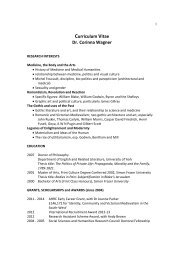'Cast out into the hellish night': Pagan Virtue and ... - Humanities
'Cast out into the hellish night': Pagan Virtue and ... - Humanities
'Cast out into the hellish night': Pagan Virtue and ... - Humanities
Create successful ePaper yourself
Turn your PDF publications into a flip-book with our unique Google optimized e-Paper software.
Philippa Byrne Ex Historia 66<br />
In De voluptate we witness Catone, <strong>the</strong> Stoic orator, dismissing <strong>the</strong> stories of <strong>the</strong> gods by calling<br />
<strong>the</strong>m mere fables [fabulae]. 79 One might expect <strong>the</strong> Epicurean to leap to <strong>the</strong> defence of pagan<br />
poetry by expounding those fables allegorically. Yet <strong>the</strong> Epicurean orator Vegio does not invoke<br />
<strong>the</strong> idea of allegory, but instead presents a simple <strong>and</strong> stark dichotomy: ei<strong>the</strong>r <strong>the</strong> gods must be<br />
defended on <strong>the</strong> basis that <strong>the</strong>y existed just as <strong>the</strong> poets described <strong>the</strong>m; or else it must be said<br />
<strong>the</strong> gods are wholly invented. There can be no compromise, no middle way, no allegorical<br />
reading. This passage is partly a reworking of Cicero’s De natura deorum, in which <strong>the</strong> academic<br />
orator, Cotta, denies that stories of pagan gods may be interpreted allegorically, as such allegories<br />
are based on false etymologies, selectively applied. 80 The same is true in De voluptate: even <strong>the</strong><br />
advocate for pagan poetry cannot rely on allegory to mount a defence of <strong>the</strong> truth of pagan<br />
philosophy. As no interlocutor can accept pagan poetry as literally true, <strong>the</strong> debate over poetic<br />
allegory fizzles <strong>out</strong>, <strong>and</strong> <strong>the</strong> focus of <strong>the</strong> dialogue turns to <strong>the</strong> role of allegory in Scripture.<br />
Closely related to <strong>the</strong> fifteenth-century debate over <strong>the</strong> poeta <strong>the</strong>ologus was <strong>the</strong> question of whe<strong>the</strong>r<br />
poetic allegory should be accorded <strong>the</strong> same status as biblical allegory. 81 The figure whom Valla<br />
selected as his Epicurean interlocutor, Maffeo Vegio, had defended this position, composing a<br />
‘supplement’ to Virgil, a thirteenth book of <strong>the</strong> Aeneid, in order to transform <strong>the</strong> work <strong>into</strong> a<br />
Christian ‘moral fable’. 82 Vegio’s Supplement concluded with Aeneas, <strong>the</strong> allegorical figuration of<br />
<strong>the</strong> virtuous soul, being translated to <strong>the</strong> stars, finally achieving his heavenly reward. Vegio<br />
explained his decision on <strong>the</strong> grounds that <strong>the</strong> Aeneid was a straightforward Christian allegory: ‘if<br />
we substitute <strong>the</strong> word heaven for Latium <strong>and</strong> life for Troy, why might <strong>the</strong> passage not have<br />
come from <strong>the</strong> pen of <strong>the</strong> Apostle Paul?’ 83<br />
79 De voluptate, I.xlvii [2] p. 131.<br />
80 Cicero, De natura deorum trans. by H. Rackham (London: Heinemann, 1979), III.xxiv.61, pp. 344-45.<br />
81 For <strong>the</strong> background to this debate see Witt, ‘Poeta Theologus’, 559; Minnis <strong>and</strong> Scott, Medieval Literary<br />
Theory, pp. 466-68.<br />
82 Vegio, Supplement (Putnam, Short Epics, pp. 2-41).<br />
83 A. Cox Br<strong>into</strong>n, Maphaeus Vegius <strong>and</strong> his Thirteenth Book of <strong>the</strong> Aeneid (New York: Garl<strong>and</strong>, repr. 1978), p.<br />
28.









